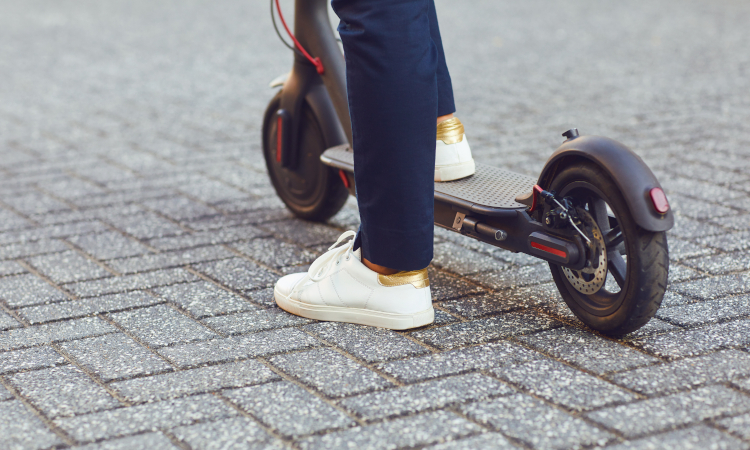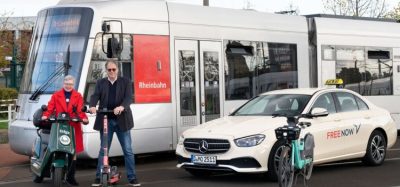TfL announces e-scooter competition for operators as trial set for 2021
- Like
- Digg
- Del
- Tumblr
- VKontakte
- Buffer
- Love This
- Odnoklassniki
- Meneame
- Blogger
- Amazon
- Yahoo Mail
- Gmail
- AOL
- Newsvine
- HackerNews
- Evernote
- MySpace
- Mail.ru
- Viadeo
- Line
- Comments
- Yummly
- SMS
- Viber
- Telegram
- Subscribe
- Skype
- Facebook Messenger
- Kakao
- LiveJournal
- Yammer
- Edgar
- Fintel
- Mix
- Instapaper
- Copy Link
Posted: 17 November 2020 | Joshua Minchin - Intelligent Transport | No comments yet
TfL, along with London Boroughs, hopes that the trial will help it learn more about the fast-growing mode of transport in a bid to implement a more permanent scheme going forward.


E-scooters will soon be heading to the capital as TfL announces a year-long trial scheme.
Transport for London (TfL), London Councils and London’s boroughs are working together on plans for a trial of rental e-scooters in the capital. A competition has been launched today, which is open to all e-scooter operators. Only three will be selected to participate in the trial, which is due to start in the spring of 2021 and will last for a year.
TfL say the trial is intended to promote safety standards, as well as helping the authority better understand the fast-growing sector of smart mobility.
Guidance issued by the Department for Transport (DfT) in summer 2020 now allows local authorities in the UK to trial e-scooters as part of a rental scheme. The use of privately owned e-scooters on public roads is not covered by these changes and remains illegal in the UK.
TfL says the trials are part of a wider approach across local and national authorities to enable people to use greener forms of transport and help avoid a damaging, car-led recovery from coronavirus, which would make air quality worse and increase congestion.
All boroughs will be able to be involved in the trial, which is likely to be the largest in the UK and TfL hope it will provide valuable data to understand the impact of these vehicles on the way people travel around the capital. Around one third of London’s boroughs have expressed their intention to join the trial initially, with more considering joining at a later stage.
According to organisers, operators taking part in the selection process will be assessed on their ability to meet strict safety requirements and high operating standards. Operators will also be required to provide critical data for TfL and the boroughs to understand the impact of e-scooters on London’s transport goals, including Vision Zero, a shift to walking, cycling and public transport, zero emission targets and other aspects of the Mayor’s Healthy Streets approach. This data will be shared with the DfT as it looks to bring in new legislation in this field.
Boroughs will control parking locations for e-scooters to protect against street clutter and will be able to designate certain areas as ‘no-go areas’ – where e-scooters cannot be ridden and will automatically come to a safe stop – or as ‘go-slow areas’, where the speed of the e-scooter will be automatically limited to 8mph. Like all other vehicles, e-scooters will be banned from riding on pavements – but will be able to use the same space as bicycles.
The number of scooters to be introduced to London during the trial has not yet been decided upon, but TfL says it expects to start slowly with between 60 and 180 e-scooters per borough participating. TfL has also stated that operators who perform well during the trial will be able to increase their fleet size over the course of the trial, whereas those who don’t could be forced to take scooters off the road.
Michael Hurwitz, TfL’s Director of Transport Innovation, said: “We’re determined to make sure that London recovers from coronavirus as safely and sustainably as possible and are supportive of innovative solutions that could help.
“Safety will be our number one priority during this e-scooter rental trial, which will be critical to providing us the data and insights we need to determine whether e-scooters are a viable part of a greener and healthier future for London. We’ll continue to take the interests of all Londoners into account as we work towards starting the trial next year.”
The response to the TfL announcement from e-scooter operators was very positive indeed. Patrick Studener, Vice-President of Bird, said: “London suffers from some of the worst congestion and air pollution in Europe. With the average car trip in the city being one person travelling less than 4 miles, it’s no wonder the city has ground to a halt.
“It’s fantastic that TfL has today recognised electric scooters can play a key role in helping London move again, decreasing congestion and improving air quality for millions – and we applaud them for that. Bird is no stranger to London having operated in the Queen Elizabeth Olympic Park for the last two years, so we’re very much looking forward to being able to spread our wings further.”
Similarly, Voi said it “welcomes the start of the tender process to run e-scooter trials in the capital.
“London is a world-leader in the provision of public transport and has been at the forefront of integrating technology and transport for many years, keeping this great city moving.
“Shared E-scooters offer London the ability to step up to the next level of electric vehicle innovation, providing a safe, inclusive, carbon-free way for people to get around the capital quickly. We are confident that Voi can help to put London on a new path to a low-carbon micro-mobility future, while helping people return to the capital’s centre safely and thereby aid in the city’s economic recovery, replacing car trips.”
Fred Jones, UK General Manager of TIER, added: “Today’s announcement is exciting and TIER is applying to participate in the London trial, which we believe can bring huge benefits to the city.
“The environmental impact of switching from cars to e-scooters for short journeys is staggering. TIER research has found that e-scooters could replace 1.2million car trips in the capital every single day, resulting in a 233-tonne reduction in daily CO2 emissions.
“With our COVID-safe helmets on every trip and an energy network that will generate millions for local stores and cafes, climate-neutral TIER is well-placed to be London’s safe, sustainable partner in the capital’s economic recovery. We very much hope to work with the city on this scheme.”
Related topics
Fleet Management & Maintenance, Mobility Services, On-Demand Transport, Transport Governance & Policy
Related modes
Bikes & Scooters
Related cities
London
Related organisations
Bird, Department for Transport (DfT), Transport for London (TfL), Voi Technology
Related people
Michael Hurwtiz, Patrick Studener







